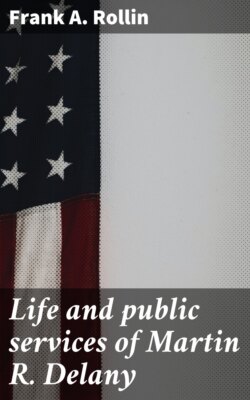Life and public services of Martin R. Delany

Реклама. ООО «ЛитРес», ИНН: 7719571260.
Оглавление
Frank A. Rollin. Life and public services of Martin R. Delany
Life and public services of Martin R. Delany
Table of Contents
INTRODUCTION
LIFE OF MAJOR M. R. DELANY
CHAPTER I. GENEALOGY
CHAPTER II. EARLY EDUCATION
CHAPTER III. STUDYING NORTH
CHAPTER IV. MORAL EFFORTS
CHAPTER V. EDITORIAL CAREER
CHAPTER VI. PRACTISING MEDICINE
CHAPTER VII. FUGITIVE SLAVE ACT
CHAPTER VIII. A HIATUS
CHAPTER IX. CANADA.—CAPTAIN JOHN BROWN
CHAPTER X. CANADA CONVENTION.—HARPER’S FERRY
CHAPTER XI. IN EUROPE
CHAPTER XII. THE INTERNATIONAL STATISTICAL CONGRESS AND LORD BROUGHAM
CHAPTER XIII. RETURN TO AMERICA
CHAPTER XIV. CORPS D’AFRIQUE
CHAPTER XV. A STEP TOWARDS THE SERVICE
CHAPTER XVI. RECRUITING AS IT WAS
CHAPTER XVII. CHANGING POSITION
CHAPTER XVIII. PRIVATE COUNCIL AT WASHINGTON
CHAPTER XIX. THE COUNCIL-CHAMBER.—PRESIDENT LINCOLN
CHAPTER XX. THE GOLD LEAF
CHAPTER XXI. IN THE FIELD
CHAPTER XXII. AT CHARLESTON AND FORT SUMTER
CHAPTER XXIII. ARMÉE D’AFRIQUE
CHAPTER XXIV. THE NATIONAL CALAMITY
CHAPTER XXV. CAMP OF INSTRUCTION
CHAPTER XXVI. EXTRAORDINARY MESSAGES
CHAPTER XXVII. NEWS FROM RICHMOND
CHAPTER XXVIII. A NEW FIELD
I. PROSPECTS OF THE FREEDMEN OF HILTON HEAD
II
V
VI
VII
CHAPTER XXIX. GENERAL SICKLES
CHAPTER XXX. RESTORING DOMESTIC RELATIONS
CHAPTER XXXI. GENERAL ROBERT K. SCOTT
CHAPTER XXXII. THE PLANTERS AND THE FREEDMEN’S BUREAU
CHAPTER XXXIII. DOMESTIC ECONOMY
CHAPTER XXXIV. CIVIL AFFAIRS.—PRESIDENT JOHNSON
CHAPTER XXXV. EDUCATIONAL INTERESTS
CHAPTER XXXVI. CONCLUSION
APPENDIX. POLITICAL WRITINGS
African Commission
Reflections on the War
The International Policy of the World towards the African Race
Political Destiny of the Colored Race on the American Continent
FOOTNOTES
LEE AND SHEPARD’S PUBLICATIONS
OLIVER OPTIC’S BOOKS
SOPHIE MAY’S BOOKS
Recently Published:
Отрывок из книги
Frank A. Rollin
Sub-Assistant Commissioner Bureau Relief of Refugees, Freedmen, and of Abandoned Lands, and late Major 104th U.S. Colored Troops
.....
It chanced one day, in the midst of their recitations, their mother being absent, they were interrupted by a man inquiring the name of their parents, then of each child, taking it down in the mean time in his book. Being satisfied, he rode away. These children, unconscious of the purport of the visit, joyfully related it to their mother on her return. Great was their astonishment to see the expression of deep dejection that overshadowed the features that but a few moments before had shone with happiness as she greeted them. Her only response to their information was a long-drawn sigh, for too well she knew that visit foreboded trouble. In a few days her fears were realized. A man called at the house, and delivered a summons to her, to the effect that it was understood that she was having her children taught to read, in direct violation of law, for which she should answer before a court of justice. The devoted mother’s consternation can be well pictured, when we recall the justice extended to the noble Prudence Crandell, in Connecticut, for teaching negro children to read. It followed, in her fears, that she resorted to the concealment of the books from her children; but the sole cause of offence to the majesty of Virginia’s laws, the knowledge, and the insatiable thirst for further acquirement, could neither be hidden nor taken from them.
This violation of law, and the inevitable consequences, were soon bruited around the country. Neither sympathy or advice was extended to the courageous woman, whose only crime was wearing a dusky skin; but instead, the jeers and scowls which the vilest culprit receives met her on every side. Mingled with their imprecations could be remembered the significant expressions, “A wholesome lesson!” “It will do that proud, defiant woman good!” “She always made pretensions above a negro.” Suits were constantly entered, and failed. She was persecuted by all, with one noble exception—that of Randall Brown, a banker, who often advised her to leave the place. Finally, in September, 1822, under the pretext of moving to Martinsburg, she left Charlestown for Chambersburg, Pa., where residing for fifteen years, her children were enabled to continue their studies, with “none to molest or make them afraid.” There, for several years, they attended school, securing such advantages as the country schools of those days afforded.
.....